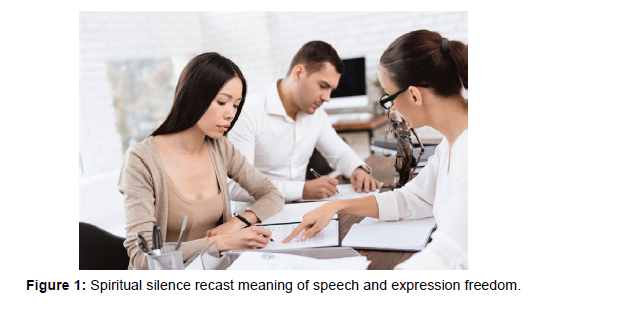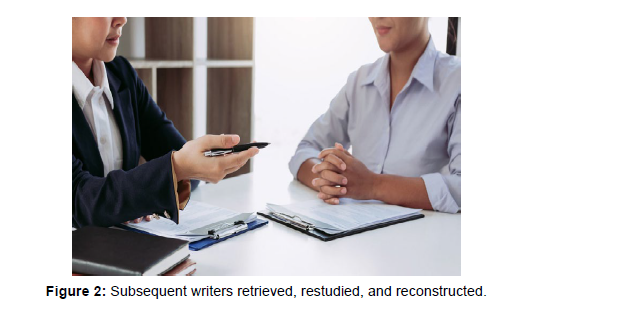Path of the Law: Christian Jurisprudence and Strong New Capitals, Captains of Christianity
Received: 21-Aug-2023 / Manuscript No. JCLS-23-114847 / Editor assigned: 24-Aug-2023 / PreQC No. JCLS-23-114847 / Reviewed: 07-Sep-2023 / QC No. JCLS-23-114847 / Revised: 13-Sep-2023 / Manuscript No. JCLS-23-114847 / Published Date: 20-Sep-2023 QI No. / JCLS-23-114847
Abstract
A growing number of law schools now also teach courses in Christian canon law, Jewish law, Islamic law, and natural law, and include serious consideration of religious materials in their treatment of legal ethics, legal history, jurisprudence, law and literature, legal anthropology, comparative law, environmental law, family law, human rights, and other basic courses. Several schools now have burgeoning interdisciplinary programs in law and religion and in law, religion, and ethics.
Keywords
Richer understanding; Christian scholars; Church life; Human rights; Freedom of speech; Public life
Introduction
Religion is no longer just the hobbyhorse of isolated and peculiar professors-principally in their twilight years. It is no longer just the preoccupation of religiously-chartered law schools. Religion now stands alongside economics, philosophy, literature, politics, history, and other disciplines as a valid and valuable conversation partner with law [1]. Catholic and Protestant scholars have been among the leaders of this law and religion movement in American legal education along with growing numbers of Jewish and Muslim scholars, and a growing number of specialists on Asian and traditional religions. Legal scholars from these various religious traditions have already learned a great deal from each other and have cooperated in developing a richer understanding of sundry legal and political subjects [2]. This comparative and cooperative interreligious inquiry into fundamental issues of law, politics, and society needs to continue-especially in our day of increasing interreligious conflict and misunderstanding. Christian scholars of law and religion, however, face some distinct challenges and opportunities in this new century that are worth spelling out. A first challenge is for us Western Catholics and Protestants to make room for our brothers and sisters in the Eastern Orthodox Christian tradition [3 ].
Methodology
Many leading Orthodox lights dealt with fundamental questions of law, politics, and society with novel insight, often giving a distinct reading and rendering of the biblical, apostolic, and patristic sources that Christians have in common. Moreover, the Orthodox Church has immense spiritual resources and experiences whose implications are only now beginning to be seen [4 ]. These spiritual resources lay, in part, in Orthodox worship-the passion of the liturgy, the pathos of the icons, the power of spiritual silence. They lie, in part, in Orthodox Church life-the distinct balancing between hierarchy and congregationalism through autocephaly, between uniform worship and liturgical freedom through alternative vernacular rites, between community and individuality through a trinitarian communalism, centred on the parish, on the extended family, on the wizened grandmother. And these spiritual resources lie, in part, in the massive martyrdom of millions of Orthodox faithful in the last century-whether suffered by Russian Orthodox under the Communist Party, by Greek and Armenian Orthodox under Turkish and Iranian radicals, by Middle Eastern Copts at the hands of religious extremists, or by North African Orthodox under all manner of fascist autocrats and tribal strongmen [5]. These deep spiritual resources of the Orthodox Church have no exact parallels in modern Catholicism and Protestantism, and most of their implications for law, politics, and society have still to be drawn out.
Discussion
It would be wise to hear what an ancient church, newly charred and chastened by decades of oppression and martyrdom, considers essential to the regime of human rights. It would be enlightening to watch how ancient Orthodox communities, still largely centred on the parish and the family, will reconstruct Christian theories of society [6]. It would be instructive to listen how a tradition that still celebrates spiritual silence as its highest virtue might recast the meaning of freedom of speech and expression as shown in (Figure 1). And it would be illuminating to feel how a people that has long cherished and celebrated the role of the woman-the wizened babushka of the home, the faithful remnant in the parish pews, and the living icon of the Assumption of the Mother of God-might elaborate the meaning of gender equality [7]. A second challenge is to trace the roots of these modern Christian teachings into the earlier modern period of the seventeenth through early nineteenth centuries. Scholars have written a great deal about patristic, scholastic, early Protestant, and post-tridentate Catholic contributions to law, politics, and society. But many of the best accounts of the history of Christian legal, political, and social thought stop in early years [8]. That was the year that the father of international law, uttered the impious hypothesis that law, politics, and society would continue even were we to accept the infamous premise that God did not exist or did not concern himself with human affairs [9]. While many subsequent writers conceded Grotius hypothesis, and embarked on the great secular projects of the Enlightenment, many great Christian writers did not. They have been forgotten to all but specialists. Their thinking on law, politics, and society needs to be retrieved, restudied, and reconstructed for our day as shown in (Figure 2). A third challenge is to make these modern Christian teachings on law, politics, and society more concrete [10]. In centuries past, the Catholic, Protestant, and Orthodox traditions alike produced massive codes of canon law and church discipline that covered many areas of private and public life. They instituted sophisticated tribunals for the equitable enforcement of these laws [11]. They produced massive works of political theology and theological jurisprudence, with ample handholds in catechisms, creeds, and confessional books to guide the faithful. Some of that sophisticated legal and political work still goes on in parts of the Christian church today. Modern Christian ethicists still take up some of the old questions. Some Christian jurists have contributed ably and amply to current discussion of human rights, family law, and religious liberty [12]. But the legal structure and sophistication of the modern Christian church as a whole is a pale shadow of what went on before. It needs to be restored lest the church loses its capacity for Christian self-rule, and its members lose their capacity to serve as responsible Christian prophets, priests, and kings [13]. The intensity and complexity of the modern culture wars over family, education, charity, religious liberty, constitutional order, just war, and other cardinal issues demand this kind of fundamental inquiry. Too often of late, Christians have marched to the culture wars without ammunition-substituting nostalgia for engagement, acerbity for prophecy, platitudes for principled argument. Too often of late, Christians have been content to focus on small battles like prayers in schools and decalogues on courthouses, without engaging the great domestic and international soul wars that currently beset us [14]. The church needs to reengage responsibly the great legal, social, and political issues of our age, and to help individual Christians participate in the public square in a manner that is neither dogmatically shrill nor naively nostalgic but fully equipped with the revitalized resources of the Bible and the Christian tradition [15 ].
Conclusion
A fourth challenge is for modern Catholic, Protestant, and Orthodox Christians to develop a rigorous ecumenical understanding of law, politics, and society. This is a daunting task. It is only in the past three decades, with the collapse of Communism and the rise of globalization that these three ancient warring sects of Christianity have begun to come together and have begun to understand each other.
Acknowledgement
None
Conflict of Interest
None
References
- Yoram J, Didier T & Olivier B (2002) A satellite view of aerosols in the climate system. Nature UK 419:215-223
- Hassan A, Qadri MA, Saleem M (2021)The Muslim Family Law Ordinance 1961: Pioneer of Women Empowerment in Pakistan.JRSP PAK 58:1-8.
- Cariou, P, Mejia MQ, Wolff, FC (2008) On the Effectiveness of Port State Control Inspections. Transp Res E Logist Transp Rev UK 44:491-503.
- Costanza R (2004) Estimates of the Genuine Progress Indicator (GPI) for Vermont, Chittenden County and Burlington, from 1950 to 2000. Ecol Econ 51:139-155.
- Lemaitre JC, Grantz KH, Kaminsky J, et al (2021) A scenario modeling pipeline for COVID-19 emergency planning. Scientific reports, 11(1), 1-13.
- Hassan A,Qadri MA,Saleem M (2021)The Muslim Family Law Ordinance 1961: Pioneer of Women Empowerment in Pakistan.JRSP PAK 58:1-8.
- Abdullah R,Monsoor T,Johari F (2015) Financial support for women under Islamic family law in Bangladesh and Malaysia. Taylor and Francis UK 21:363-383.
- Shahid TN (2013) Islam and women in the constitution of Bangladesh: The impact on family laws for Muslim women.FLJS UK:1-11.
- Shehabuddin E (2008).Reshaping the holy: Democracy, development, and Muslim women in Bangladesh.CUP NY:1-304.
- Hossain K(2003) In Search of Equality: Marriage Related Laws for Muslim Women in Bangladesh.J IntWomen's Stud MA 5:1-38.
- Yoram J, Didier T & Olivier B (2002) A satellite view of aerosols in the climate system.Nature UK 419:215-223.
- Ramanathan P, Crutzen, J, Rosenfeld D (2001) Aerosols, climate, and the hydrological cycle. Nature UK 294:2119-24.
- Stebek EN (2018) Consumer protection law in Ethiopia: The normative regime and the way forward. J Consum Policy US 41:309-332.
- Dawar K, Ndlovu N (2018) A comparative assessment of competition in Africa: Identifying drivers of reform in Botswana, Ethiopia, and Nigeria. J Antitrust Enforc OUP UK 6:150-172.
- Stebek EN (2017) Deliverables and pledges under Ethiopian Trade Competition Law: the need for private sector empowerment and enablement.Miz L Rev EA 11:1-32.
Indexed at, Google Scholar, Crossref
Indexed at, Google Scholar, Crossref
Indexed at, Google Scholar, Crossref
Indexed at, Google Scholar, Crossref
Indexed at, Google Scholar, Crossref
Indexed at, Google Scholar, Crossref
Citation: Antonopoulos G (2023) Path of the Law: Christian Jurisprudence andStrong New Capitals, Captains of Christianity. J Civil Legal Sci 12: 403.
Copyright: © 2023 Antonopoulos G. This is an open-access article distributedunder the terms of the Creative Commons Attribution License, which permitsunrestricted use, distribution, and reproduction in any medium, provided theoriginal author and source are credited.
Select your language of interest to view the total content in your interested language
Share This Article
Recommended Journals
Open Access Journals
Article Usage
- Total views: 1222
- [From(publication date): 0-2023 - Dec 08, 2025]
- Breakdown by view type
- HTML page views: 895
- PDF downloads: 327


